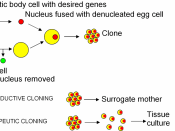Surrogate Motherhood is when one women carries to term
the fertilized egg of another woman. This procedure is chosen
by married couples who can not conceive a child in the "natural
way". In some occasions the mother may be able to produce an
egg, but has no womb or some other physical problem which
prevents her from carrying a child. Whether or not the husband
can produce a large amount of sperm is not a problem. Once the
egg and sperm are combined in a petri dish fertilization is very
likely to occur. The couple will then choose a surrogate
mother and make an agreement in which she will carry the baby
and release it to the genetic parents after the birth. There are
four different kinds of surrogacy arrangements. Total
Surrogacy is when the woman bears a child that has been formed
from the gametes of another woman and man and implanted in her
body. Partial Surrogacy occurs when the birth mother
contributes the ovum and the sperm is introduced by artificial
insemination. She is a biological parent of the child. Commercial
Surrogacy means a business-like transaction where a fee is
charged for the incubation period. Lastly, there is a
Non-Commercial Surrogacy in which there is no formal contract
Bradley 2
or any payment to the birth mother. It is usually an arrangement
between close friends or family members.(1-10)
There is no federal policy on the issue of surrogacy, all
fifty states have been left to decide theses issues themselves
and create their own policies. The majority of the states have
not yet legislated on this subject. Those states that have taken
positions differ greatly from one another, such as California
and Virginia, who have taken opposing viewpoints California is
the state that is the most sympathetic to the...


